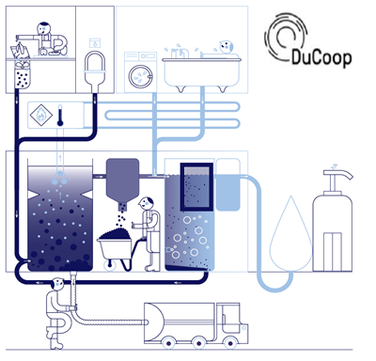Mathematical framework for decision making upon resource recovery from urban wastewater
About this project
Goal of the project
The main goal of this assignment is to develop a mathematical framework for finding the most feasible technology or sequence of technologies for recovering specific resources from various urban wastewater streams.
Link with theme's Energy, Water and Vitality
Central to the mathematical model is the recovery of resources including thermal and chemical energy and water.
Professorships and/or organizations involved
This minor project is part of the a PhD research project from Wageningen University and Research, which financed by the NEREUS (New Energy and Resources from Urban Sanitation) project and partly by HZ University of Applied Sciences. The NEREUS project falls under the Interreg 2 Seas program 2014-2020 co-funded by the European Regional Development Fund under subsidy contract No 2S03-011.
Role and ambition of stakeholders involved
The ambition within the NEREUS project is to develop a decision support tool that can help various stakeholders to find the optimal technical solution for resource recovery from urban wastewater in decentralized concepts.
What's in it for me?
Activities and design of the minor project
- Literature study
- Mathematical modeling
- Validation and optimization of the model
Results to be developed
- Mathematical model for decision making
Which skills you can develop in this project
- A very general understanding of wastewater management and the multi-disciplinary aspects of decision making;
- In depth understanding of applied mathematics in decision science;
For which study programs or fields of interest is this project suitable?
- applied mathematics
- operational research
- IT
- environmental technology
- water technology
Knowledge and skills desired or required
- mathematical modelling
- programing
- process engineering
How you will be supervised
A coach and the workfield (organisations, professorships, etc.) will coach you and collaborate with you to developing the results and your professional skills required for this project. This minor project is provided by the Water Technology research group here at HZ University of Applied Sciences and you will be supervised by researcher/lecturer, MSc Maria van Schaik with support from senior lecturer, dr. ir. Hans Cappon.
Practical information
- Start and duration: 27th of August 2018 - 25st of January 2019
- Amount of participants: 3 – 4
- Language: English
- Credits: 30 ECTS
- Minimum grade: 5.5 (out of 10)
- Sign up: HZ students: go to MyHZ > Minorkeuze (widget to select the minor of your choice). External students: go to Kies op Maat > select the minor of your choice.
- Registration deadline: 1 June 2018
- Contact: for information about the project: MSc Maria van Schaik, maria.van.schaik@hz.nl or dr. ir. Hans Cappon, hans.cappon@hz.nl. For general information about the minor: Gabriëlle Rossing, gabrielle.rossing@hz.nl.
References
- Bixio, Davide et al. 2006. “Wastewater Reuse in Europe.” Desalination 187(1–3):89–101.
- Drosg, Bernhard et al. 2015. Nutrient Recovery by Biogas Digestate Processing. Retrieved (http://www.iea-biogas.net/files/daten-redaktion/download/Technical Brochures/NUTRIENT_RECOVERY_RZ_web1.pdf%5Cnhttp://www.iea-biogas.net/files/daten-redaktion/download/Technical Brochures/NUTRIENT_RECOVERY_RZ_web2.pdf).
- Hamouda, M. A., W. B. Anderson, and P. M. Huck. 2009. “Decision Support Systems in Water and Wastewater Treatment Process Selection and Design: A Review.” Water Science and Technology 60(7):1767–70.
- Holmgren, Katrin Eitrem, Hong Li, Willy Verstraete, and Peter Cornel. 2014. “State of the Art Compendium Report on Resource Recovery from Water.”
- Khiewwijit, Rungnapha. 2016. New Wastewater Treatment Concepts towards Energy Saving and Resource Recovery -PhD Thesis.
- Muga, Helen E. and James R. Mihelcic. 2008. “Sustainability of Wastewater Treatment Technologies.” Journal of Environmental Management 88(3):437–47.
- Roeleveld, I. P., D. Roorda, and M. Schaafsma. 2010. “NEWs: THE DUTCH ROADMAP FOR THE WWTP OF 2030.”
Project summary
Urban wastewater, as the carrier of various wastes, is considered to be polluted and it should always be treated before discharge. However, scientific experience and technological innovations have been proving that some of these pollutants have actual value and thus can be recovered and used as resources (Roeleveld, Roorda, and Schaafsma 2010). Finding the suitable technological solution for resource recovery (energy, nutrients and water) from urban wastewater is not yet straightforward, often due to technical, economic and legislative challenges (Holmgren et al. 2014). Varying quality and quantity of different urban wastewater streams as well as the environmental impact due to the consumption of energy and chemicals are challenging decision makers when choosing suitable technologies and locations for end–of-pipe solutions (Khiewwijit 2016; Muga and Mihelcic 2008). Moreover, social aspects, such as acceptance of recovered products in the market, play an important role when choosing a technology for resource recovery (Bixio et al. 2006; Drosg et al. 2015). There is plenty of experience with decision making for water and wastewater treatment (Hamouda, Anderson, and Huck 2009) but almost nonexistent for resource recovery from wastewater.
| Start date: | augustus 27, 2018 |
| End date: | januari 25, 2019 |
